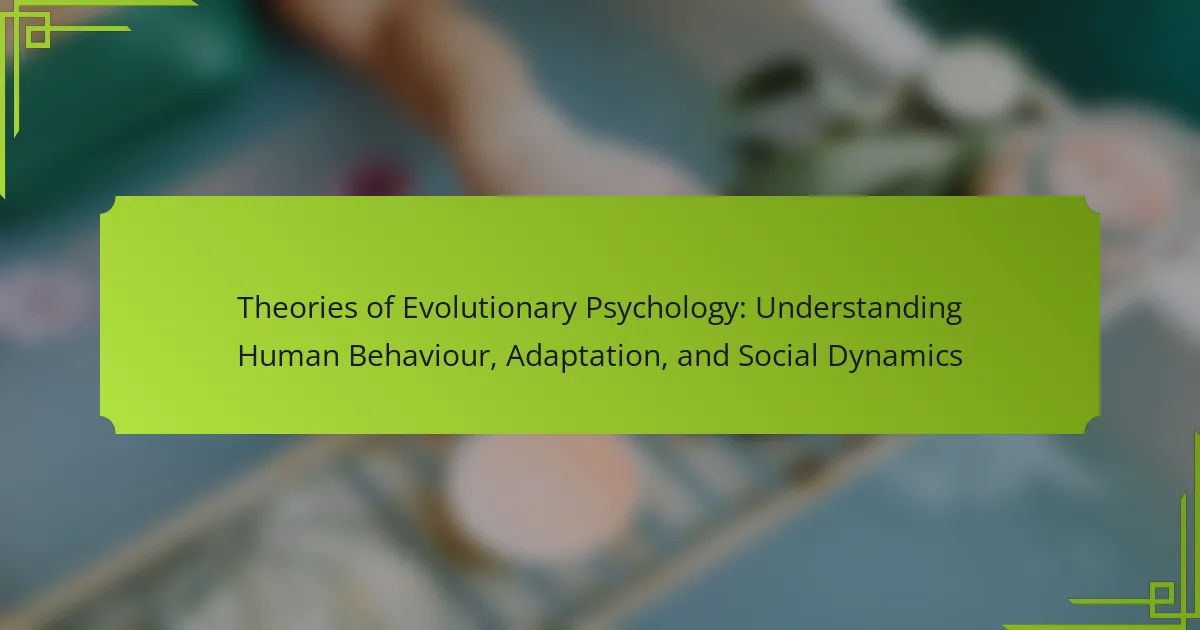Understanding the theories of evolutionary psychology can illuminate the reasons behind human behaviour, adaptation, and social dynamics. Key perspectives include the adaptationist view, modularity of mind, and parental investment theory. These frameworks explain how psychological traits evolved for survival and reproduction. Insights gained can enhance relationships, improve mental health, and inform social interactions.

What are the foundational theories of evolutionary psychology?
The foundational theories of evolutionary psychology explain human behaviour through the lens of adaptation and survival. Key theories include the adaptationist perspective, which posits that psychological traits evolve to solve problems faced by our ancestors. The modularity of mind theory suggests that the brain consists of specialised modules that evolved for specific functions. Another significant theory is the parental investment theory, highlighting how reproductive strategies influence behaviour and social dynamics. These theories collectively provide insights into the evolutionary roots of human cognition and social interactions.
How does evolutionary psychology explain human behaviour?
Evolutionary psychology explains human behaviour as a product of adaptations shaped by natural selection. It posits that many behaviours have evolved to solve problems related to survival and reproduction. For instance, social behaviours enhance group cohesion, which increases chances of survival. This framework emphasises the role of inherited traits in shaping psychological mechanisms and behaviours. Understanding these mechanisms helps clarify why certain behaviours are universal across cultures, highlighting the influence of evolutionary pressures on human social dynamics.
What role does natural selection play in shaping social dynamics?
Natural selection significantly influences social dynamics by shaping behaviours that enhance survival and reproduction. It fosters cooperation and competition within groups, impacting social hierarchies and alliances. For example, altruistic behaviours can arise as adaptive strategies, promoting group cohesion and increasing the chances of collective survival. This interplay of individual traits and social structures highlights the unique attribute of adaptability in human behaviour, revealing how evolutionary pressures mould intricate social interactions over time.
What are the key mechanisms of adaptation?
Adaptation occurs through mechanisms like natural selection, genetic drift, and gene flow. These processes influence behaviour, promote survival, and enhance reproductive success. Natural selection favours traits that improve fitness in specific environments. Genetic drift introduces random changes in allele frequencies, while gene flow facilitates the exchange of genetic material between populations.
How do evolutionary theories apply to modern human relationships?
Evolutionary theories significantly influence modern human relationships by explaining behaviours rooted in survival and reproduction. These theories suggest that attraction, mate selection, and social bonds have evolved to enhance reproductive success. For instance, traits like kindness and loyalty are often favoured due to their adaptive advantages in ensuring offspring survival. Additionally, the concept of parental investment highlights how different mating strategies impact relationship dynamics, fostering deeper connections in long-term partnerships. Understanding these evolutionary foundations allows individuals to navigate social interactions with greater awareness of underlying motivations.

What are the universal attributes of evolutionary psychology?
The universal attributes of evolutionary psychology include adaptation, survival mechanisms, reproductive strategies, and social behaviour. These attributes help explain human behaviour through the lens of natural selection and environmental pressures.
Adaptation refers to the ways humans have evolved to meet environmental challenges. Survival mechanisms encompass instincts and behaviours that enhance chances of survival. Reproductive strategies involve mate selection and parenting approaches that maximise genetic success. Social behaviour includes cooperation and competition, shaping group dynamics and societal structures.
How does the concept of fitness influence behaviour?
Fitness significantly influences behaviour by shaping adaptive traits that enhance survival and reproduction. This concept underpins various theories in evolutionary psychology, illustrating how behaviours evolve to meet environmental demands. For instance, traits like cooperation or competition arise as individuals seek to maximise their fitness in social dynamics. Understanding these behaviours helps explain human interactions and societal structures, revealing the evolutionary roots of our actions.
What are the common adaptive strategies observed in humans?
Humans commonly employ adaptive strategies such as social cooperation, problem-solving, and resource sharing. These strategies enhance survival and reproduction. Social cooperation fosters group cohesion, while problem-solving enables effective responses to environmental challenges. Resource sharing ensures access to essential supplies, promoting community resilience.

What unique attributes distinguish evolutionary psychology from other psychological theories?
Evolutionary psychology is distinguished by its focus on the adaptive functions of behaviour, unlike other psychological theories that may prioritise environmental or cognitive factors. This unique attribute emphasises the role of evolutionary processes in shaping human psychology. For example, evolutionary psychology explores how ancestral challenges influence modern social dynamics and individual behaviours. Additionally, it integrates concepts from biology, anthropology, and neuroscience, providing a multidisciplinary perspective that is less common in other psychological frameworks. This approach allows for a deeper understanding of innate human tendencies and their origins.
How does evolutionary psychology address the nature vs. nurture debate?
Evolutionary psychology bridges the nature vs. nurture debate by emphasising the role of innate biological factors in shaping human behaviour. It posits that many psychological traits are products of evolutionary processes, suggesting that genetics significantly influence behaviours traditionally attributed to environmental factors. This perspective highlights how adaptation to ancestral environments informs modern social dynamics and individual choices. For example, instincts related to survival and reproduction are seen as evolved responses that persist in contemporary contexts. Thus, evolutionary psychology offers a framework to understand the complex interplay between inherited traits and environmental influences.
What are the unique insights into mate selection and reproductive strategies?
Human mate selection and reproductive strategies reveal significant insights into evolutionary psychology. These strategies often reflect adaptive behaviours shaped by environmental pressures and social dynamics.
Unique attributes of mate selection include preferences for physical traits, resources, and social status. Research indicates that women often prioritise stability and resource availability, while men may focus on youth and fertility indicators.
Additionally, rare attributes such as genetic compatibility and personality traits play crucial roles in mate selection. These factors influence long-term relationship satisfaction and reproductive success.
Understanding these dynamics enhances our comprehension of human behaviour and social structures, illustrating how evolutionary pressures continue to shape our interactions.

What rare attributes are notable within evolutionary psychology?
Evolutionary psychology features notable rare attributes that enhance understanding of human behaviour. These include the concept of evolved psychological mechanisms, which are specific mental processes shaped by natural selection. Another rare attribute is the emphasis on cross-cultural universality, suggesting that certain psychological traits manifest similarly across diverse societies. Additionally, the focus on the role of ancestral environments highlights how historical contexts influence modern behaviours. These attributes contribute to a deeper grasp of adaptation and social dynamics within the framework of evolutionary psychology.
How do cultural variations influence evolutionary psychological theories?
Cultural variations significantly shape evolutionary psychological theories by influencing human behaviour and social dynamics. These theories suggest that environmental factors, including cultural practices, affect adaptive strategies and psychological traits. For example, collectivist cultures may prioritise group harmony, while individualistic cultures emphasise personal achievement. This divergence highlights unique attributes in behaviour and cognition, such as differing approaches to conflict resolution and resource allocation. Understanding these cultural influences enriches the application of evolutionary psychology across diverse populations.
What are the less common applications of evolutionary psychology in understanding mental health?
Less common applications of evolutionary psychology in understanding mental health include exploring adaptive behaviours in coping with stress, examining the role of ancestral environments in modern mental disorders, and analysing social hierarchies’ impact on psychological well-being. These applications provide insights into how evolutionary pressures shape current mental health issues and treatment approaches. For example, understanding the evolutionary basis of anxiety can inform therapeutic strategies that align with innate human responses to threats.

How do evolutionary psychology theories inform our understanding of aggression?
Evolutionary psychology theories suggest that aggression is a behaviour shaped by natural selection to enhance survival and reproductive success. These theories indicate that aggression can serve various functions, such as resource acquisition and intrasexual competition. Research shows that aggression is often context-dependent, varying across situations and cultures. For example, higher levels of aggression may be observed in competitive environments, reflecting adaptive strategies. Understanding these dynamics helps explain why aggression persists in human behaviour, linking it to evolutionary pressures and social structures.
What are the evolutionary roots of altruism and cooperation?
Altruism and cooperation have evolutionary roots in the survival benefits they offer to groups. These behaviours enhance group cohesion and increase the chances of survival for individuals within social units. Kin selection theory suggests that altruistic behaviours are more likely to occur among closely related individuals, as helping relatives ensures the continuation of shared genes. Reciprocal altruism posits that individuals are likely to help those who have helped them in the past, fostering cooperation. Empirical studies indicate that cooperation can lead to enhanced resource acquisition and successful reproduction, reinforcing these behaviours across generations.

What practical applications can be derived from evolutionary psychology?
Evolutionary psychology has practical applications in understanding behaviour, improving relationships, and enhancing mental health. It helps identify the roots of social dynamics and conflict resolution. For example, insights into mate selection can inform relationship counselling. Understanding group behaviours aids in team dynamics and leadership strategies. Additionally, evolutionary principles can guide therapeutic approaches by addressing innate human motivations.
How can understanding evolutionary psychology improve personal relationships?
Understanding evolutionary psychology enhances personal relationships by revealing the underlying motivations and behaviours shaped by human evolution. This insight fosters empathy, improves communication, and helps navigate conflicts. Recognising innate social dynamics, such as attachment styles and mate selection preferences, allows individuals to respond more effectively to their partner’s needs. Consequently, relationships can become more resilient and fulfilling when both partners understand these evolutionary influences on behaviour.
What are the best practices for applying evolutionary insights in everyday life?
To apply evolutionary insights in everyday life, focus on understanding behaviour, adaptation, and social dynamics. Recognise that human behaviour is shaped by evolutionary processes. Use this knowledge to enhance interpersonal relationships, improve decision-making, and foster resilience. For example, understanding the evolutionary basis of cooperation can lead to stronger team dynamics. Emphasising adaptability can help navigate challenges more effectively. Lastly, applying insights about social hierarchies may improve leadership skills and group interactions.
What common mistakes should be avoided when interpreting evolutionary psychology?
Common mistakes in interpreting evolutionary psychology include oversimplifying complex behaviours, ignoring cultural influences, and misapplying evolutionary concepts. Failing to consider the interplay between biology and environment can lead to inaccurate conclusions. Additionally, attributing modern behaviours solely to ancestral adaptations overlooks the role of social dynamics. Lastly, neglecting the diversity of human experiences can result in a narrow understanding of psychological phenomena.
